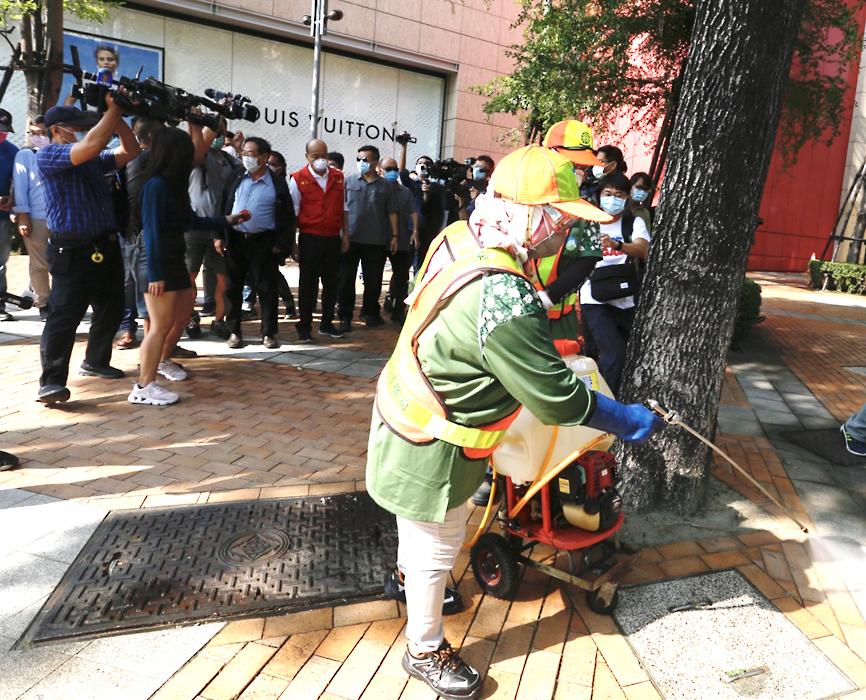Naval personnel caught up in the “Friendship Flotilla” COVID-19 cluster infection should undergo 28 days of isolation, not just 14, public health experts at National Taiwan University (NTU) said yesterday.
Three Republic of China Navy vessels were part of the operation, with the Central Epidemic Command Center (CECC) reporting 24 confirmed COVID-19 cases among those who were onboard the Panshih (磐石) supply vessel.
All 744 officers, sailors and cadets on board the three vessels were recalled on Saturday for testing and ordered into quarantine facilites.

Photo: CNA
The vessels set off on March 5 and docked in Palau from March 12 to March 15, where 337 people disembarked.
The ships returned to the Zuoying Naval Base in Kaohsiung on April 6 and the crew disembarked on April 15.
NTU College of Public Health vice dean Tony Chen (陳秀熙) said that disease prevention is extremely difficult on ships, as the limited space makes it hard to implement social distancing.
The reproduction number (R0), the average number of secondary infections from one person with COVID-19, on ships has been relatively high, Chen said.
The R0 on the Diamond Princess cruise ship was 5.7, while 24 percent of those on board tested positive, the USS Theodore Roosevelt aircraft carrier had an R0 of 6.6 and an infection rate of 14 percent, and the Charles de Gaulle aircraft carrier had an R0 of 5.7 and an infection rate of 52 percent, Chen said, adding that the Panshih had disease prevention resources, so its infection rate so far is 7 percent, while its R0 is yet to be confirmed.
Finding the index case is necessary to clarify the situation, but the most important thing is to prevent a second wave of local infections that might arise from these cases, so the central government reacted properly by immediately ordering the 744 people who were on board to go into isolation.
NTU College of Public Health dean Chan Chang-chuan (詹長權) said that after the 14 days of quarantine, the naval personnel should be kept under observation for another 14 days.
The contact investigation should cover a wider time frame — as early as one week before the crew boarded the vessels in Taiwan — and all people who had close contact with those confirmed to have COVID-19 to lower the risk of the virus spreading from this source, Chan said.
All crews should be tested for the novel coronavirus before they are allowed to disembark from ships, he said.
Separately, Institute of National Defense and Security Research senior analyst Su Tzu-yun (蘇紫雲) on Sunday said that to reduce damage from nuclear and biological attacks, modern military ships have an overpressure protection system, which makes containing the spread of diseases more difficult.
However, installing ultraviolet lights in return air ducts of the central air conditioning system can significantly reduce airborne viruses, Su said, citing studies from the 2003 SARS pandemic.
Rooms on ships should have air purifiers that meet the High-Efficiency Particulate Air (HEPA) standard for air filters, he said.
For protection against viral droplets, the military cannot depend solely on masks, but should consider other equipment, such as the military-standard scarves the Japan Self-Defense Forces and the US military use, as they can block droplets and be worn for a long time, he said.
When building military ships, disease-prevention factors should be incorporated, he said.
Additional reporting by Huang Hsin-po

Taiwan is to have nine extended holidays next year, led by a nine-day Lunar New Year break, the Cabinet announced yesterday. The nine-day Lunar New Year holiday next year matches the length of this year’s holiday, which featured six extended holidays. The increase in extended holidays is due to the Act on the Implementation of Commemorative and Festival Holidays (紀念日及節日實施條例), which was passed early last month with support from the opposition Chinese Nationalist Party (KMT) and Taiwan People’s Party. Under the new act, the day before Lunar New Year’s Eve is also a national holiday, and Labor Day would no longer be limited

Taiwan is to extend its visa-waiver program for Philippine passport holders for another year, starting on Aug. 1, Minister of Foreign Affairs Lin Chia-lung (林佳龍) said on Friday. Lin made the announcement during a reception in Taipei marking the 127th anniversary of Philippine independence and the 50th anniversary of the establishment of the Manila Economic and Cultural Office (MECO) in Taiwan, the Ministry of Foreign Affairs said. The decision reflected Taiwan’s commitment to deepening exchanges with the Philippines, the statement cited Lin as saying, adding that it was a key partner under the New Southbound Policy launched in 2016. Lin also expressed hope

Costa Rica sent a group of intelligence officials to Taiwan for a short-term training program, the first time the Central American country has done so since the countries ended official diplomatic relations in 2007, a Costa Rican media outlet reported last week. Five officials from the Costa Rican Directorate of Intelligence and Security last month spent 23 days in Taipei undergoing a series of training sessions focused on national security, La Nacion reported on Friday, quoting unnamed sources. The Costa Rican government has not confirmed the report. The Chinese embassy in Costa Rica protested the news, saying in a statement issued the same

Temperatures in New Taipei City’s Sindian District (新店) climbed past 37°C yesterday, as the Central Weather Administration (CWA) issued heat alerts for 16 municipalities, warning the public of intense heat expected across Taiwan. The hottest location in Taiwan was in Sindian, where the mercury reached 37.5°C at about 2pm, according to CWA data. Taipei’s Shilin District (士林) recorded a temperature of 37.4°C at noon, Taitung County’s Jinfeng Township (金峰) at 12:50 pm logged a temperature of 37.4°C and Miaoli County’s Toufen Township (頭份) reached 36.7°C at 11:40am, the CWA said. The weather agency yesterday issued a yellow level information notice for Taipei, New